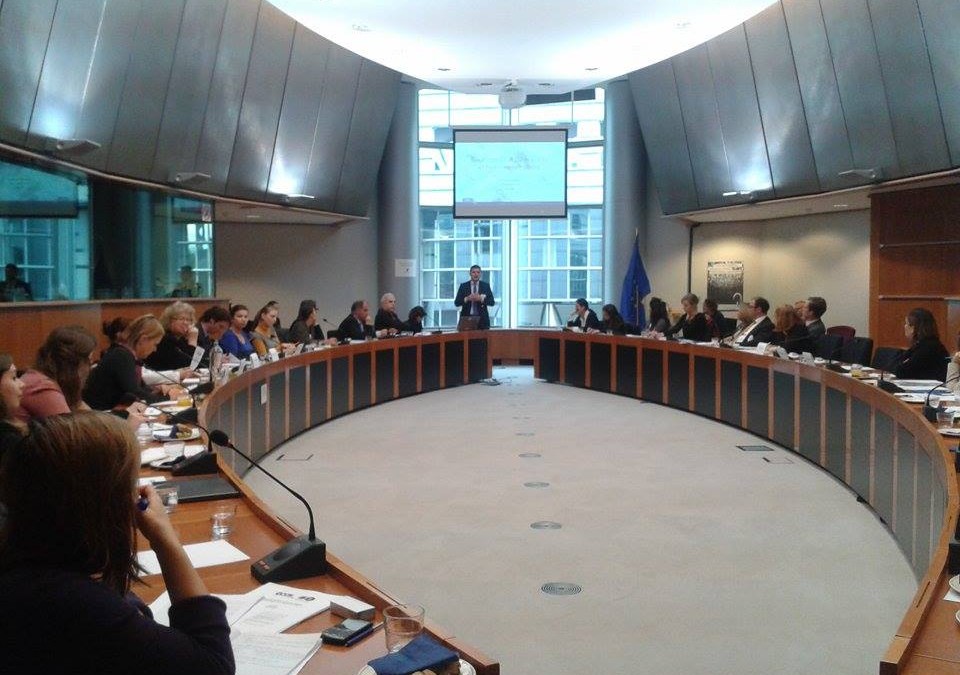
by info@ecas.org | Nov 26, 2014 | News
The combination of enlargement of the EU, the ongoing financial crisis and disenchantment with mainstream politics has led to populist politicians making false claims about the free movement of persons in the EU and calling for withdrawal from the EU in order to re-assert control over migration policy. Regrettably, this vitriolic rhetoric has resonated with parts of the electorate in certain EU countries, as evidenced by the sizeable number of Eurosceptic politicians elected to the European Parliament. The worrying result – at least in the UK – is that mainstream politicians have started to echo the anti-migration policies advocated by these populist politicians. To ensure this does not become an EU-wide trend, it is necessary for our politicians who believe in the benefits of European integration to be able to present the benefits of free movement using the same rhetorical tactics deployed by populist politicians. It is not good enough for our politicians to simply highlight the benefits which EU membership has had on the economy or jobs as a whole. Read the Seventh...
by info@ecas.org | Nov 19, 2014 | News
Transparent cooperation between Member States is the key. Such cooperation should be guided by independent expert advice and coordinated by the Commission. It is preferable to a situation where each Member States goes its own way by taking unilateral action that results in a clamp down on legitimate forms of free movement in a blind attempt to curb abuses. While the Commission has established a group of Member States’ experts on the practical implementation of Directive 2004/38/EC, there is no legal instrument that provides a framework of its operation. As a result, the minutes of its meetings are not made available to the public and nor are its recommendations or other documents which it produces. Moreover, there is no involvement of civil society organisations that could participate as members or observers. It is only through cooperation that is guided by independent expertise that Member States will be able to develop appropriate and effective methods to respond to challenges that might be generated by the free movement of persons. Read Strategy...

by info@ecas.org | Nov 19, 2014 | News
The sixth strategy calls on a translation of all EU Court of Justice jurisprudence related to free movement prior to 2004 in all the EU languages. When citizens face obstacles to free movement in the EU, this can often be the result of a lack of awareness of public authorities. In order to surmount this obstacle, citizens who seek to exercise their EU rights – and their advisers – will want to cite the relevant provisions of Directive 2004/38 and possibly also the national provisions that give it effect as well as other official sources of information. This becomes more difficult when citizen are faced by an implementation gap, namely a situation where there is a significant difference between the EU legal framework and the way it is implemented and applied in practice by the Member States. This is particularly the case of rights, which are not contained in Directive 2004/38 but result from case law of the EU Court of Justice. Important cases such as Case 26/62 Van Gend & Loos relating to the direct effect of EU law and Joined Case C-6/90 and 9/90 Francovic on the liability of Member States for breaches of EU law, are not currently available in the official languages of these newer Member States. Under EU law, the principle of legal certainty requires that the effect of EU law must clear and predictable for those who are subject to it, which presupposes that EU law should first be made public. Given the central role which the EU Court of Justice plays in the interpretation of EU law, it is implicit in this principle...

by info@ecas.org | Nov 13, 2014 | News
Cross-party MEPs have called for a working group to be set up in order to monitor the enforcement of free movement rules in different Member states in light of the recent and unprecedented calls from several governments to impose further restrictions on the free movement of persons. These MEPs attended the lunch-seminar in the European Parliament on “Free Movement in the EU Today: Challenges and Opportunities”, organised by Ms Jean Lambert, MEP, Group of the Greens/European Free Alliance and the European Citizen Action Service (ECAS). During the meeting, the main findings of the ECAS study on the fiscal impact of EU migration in Austria, Germany, the Netherlands and UK were unveiled. This report showed that EU migrants are in general younger, have fewer children and are more educated than the average citizen of the hosting country. Ms. Jean Lambert, Group of the Greens/European Free Alliance, commented that “This report unequivocally shows that EU migrants make a net positive contribution to the economy of the host Member State.” Some of the statements made by the MEPs during the event: “Migration became our “daily bread” nowadays, our everyday reality , but it hasn’t become part of our education.”– Ms. Danuta Jazlowiecka, MEP, Group of the European People’s Party (Christian Democrats). “Freedom of movement is a fundamental part of the European Union and actually labour migrants contribute more to the economical system of the new country, than the amount of benefits that they claim.”- Ms. Cecilia Wikstrom, MEP, Group of the Alliance of Liberals and Democrats for Europe. “Migrants are an opportunity and not a threat. Let’s have a discussion based on...
by info@ecas.org | Nov 12, 2014 | News
After 6 months of intense labour, we are happy to share with you the study on the Fiscal Impact of EU migrants in Austria, Germany, the Netherlands and the UK. Read the Fiscal Impact of EU Migrants in Austria, Germany, the Netherlands and the...

by info@ecas.org | Nov 12, 2014 | News
In April 2013, the Ministers of four EU Member States – the UK, Austria, Germany and the Netherlands – wrote to the Irish Presidency of the European Council on the matter of free movement of persons within the Union. The letter specifically concerned the issue of “benefits tourism”, namely the abuse of national welfare systems, and fraud, such as marriages of convenience. The measures proposed by the quartet include curtailing the right of newly arrived migrants to claim benefits and introducing bans on re-entry for those found to be abusing or defrauding the system. The letter offered no concrete evidence to back up the claims of systemic abuse and fraud that would justify the specific measures advocated. While the letter decried the systemic abuse of free movement through marriages of convenience, only one of its Member State authors, namely the UK, systematically collates statistics on suspected sham marriages. Aside from this sole exception, none of these countries collates any kind of reliable data on other forms of abuse of free movement rules. The Commission’s open challenge to the quartet to produce evidence of the extent and scale of benefits tourism has been met with silence. The UK’s attempt to generate such evidence through its Balance of Competences Review ended in ignominy amid allegations that the Government was withholding the final report because it was too “pro-European. While ad hoc studies have been published to show the impact that EU migration has had on welfare benefits in the EU as a whole and public finances in some Member States as well as at the local level, data needs to be...





